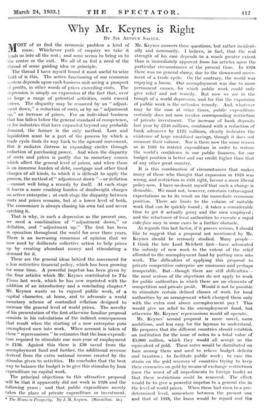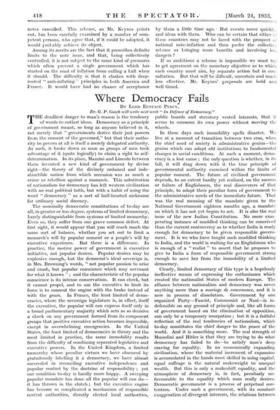Why Mr. Keynes is Right BY SIR ARTHUR SALTER.
MOST of us find the economic problem a kind of maze. Whichever path of enquiry we take it leads us into all the rest ; and none seems to bring us to the centre or the exit. We all of us feel a need of the thread of some guiding idea or principle.
The thread I have myself found it most useful to seize hold of is this. The active functioning of our economic system depends upon each business unit seeing a prospect of profits, in other words of prices exceeding costs. The depression is simply an expression of the fact that, over so large a range of potential activities, costs exceed prices. The disparity may be removed by an "adjust- ment down," a reduction of costs, or by an "adjustment up," an increase of prices. For an individual business that has fallen below the general standard of competence, or for industries that have expanded beyond any probable demand, the former is the only method. • Loss and liquidation must be a part of the process by which a trade cycle finds its way back to the upward movement. But it radiates distress in expanding circles through reduction of purchasing power. And when the disparity of costs and prices is partly due to monetary causes which affect the general level of prices, and when there is an immense burden of debt, mortgage and other fixed charges of all kinds, to which it is difficult to apply the process, the method of" adjustment down "—or deflation —cannot well bring a remedy by itself. At each stage it leaves a more crushing burden of deadweight charges on active enterprise ; at each stage the disparity between costs and prices remains, but at a lower level of both. The economizer is always chasing his own tail and never catching it.
That is why, in such a depression as the present one, we need a combination of "adjustment down," or deflation, and "adjustment up." The first has been in operation throughout the world for over three years. There is an increasing consensus of opinion that we now need by deliberate collective action to help prices up by creating abundant money and stimulating a demand for it.
These are the general ideas behind the movement for a less restrictive financial policy, which has been growing for some time. A powerful impetus has been given by the four articles which Mr. Keynes contributed to The Times last week, which he has now reprinted with the addition of an introductory and a concluding chapter.* Mr. Keynes wants us to expand public work, of a capital character, at home, and to advocate a world monetary scheme of controlled reflation designed to increase the general level of world prices. The novelty of his presentation of the first otherwise familiar proposal consists in his calculations of the indirect consequences that result when the starting of a new enterprise puts unemployed men into work. When account is taken of these" repercussions " he estimates that the loan-expendi- ture required to stimulate one man-year of employment is £150. Against this there is £50 saved from the unemployment fund and further, the additional revenue derived from the extra national income created by the stimulus given to activities. He concludes that the best way to balance the budget is to give this stimulus by loan expenditure on capital work.
The principal objections to this attractive proposal will be that it apparently did not work in 1928 and the following years ; and that public expenditure merely takes the place of private expenditure or investment.
• The Meares to Prosperity. By J. M. Keynes. (Macmillan. Is.) Mr. Keynes answers these questions, but rather incident- ally and summarily. I believe, in fact, that the real strength of his case depends to a much greater extent than is immediately apparent from his articles upon the particular circumstances of the present time. In 1928 there was no general slump, due to the downward move- ment of a trade cycle. On the contrary, the world was enjoying a boom. Our unemployment was due to more permanent causes, for which public work could only give relief and not remedy. But now we are in the trough of a world depression, and for this the expansion of public work is the orthodox remedy. And, whatever may be the case at other times, public expenditure certainly does not now involve corresponding restriction of private investment. The increase of bank deposits last year by 1246 millions, combined with a reduction of bank advances by £123 millions, clearly indicates the existence of large unutilized savings, though it does not measure their volume. Nor is there now the same reason as in 1931 to restrict expenditure in order to restore the world's confidence in our public finances, for our budget position is better and our credit higher than that of any other great country.
It is this combination of circumstances that makes many of those who thought that expansion in 1928 was wrong, and restriction in 1931 right, favour a more liberal policy now. I have no doubt myself that such a change is desirable. We must not, however, entertain extravagant expectations as to its result on the immediate economic position. There are limits to the volume of suitable work that can be quickly found ; it takes a considerable time to get it actually going and the men employed ; and the reluctance of local authorities to execute a rapid rolle-face may in some cases be a further obstacle.
As regards this last factor, if it proves serious, I should like to suggest that a proposal not mentioned by Mr. Keynes should be seriously studied. Many people— I think the late Lord Melchett first—have advocated the subsidy of new work to the extent of the relief afforded to the unemployment fund by putting men into work. The difficulties of applying this proposal to private competitive enterprise are enormous and perhaps insuperable. But—though there are still difficulties— the most serious of the objections do not apply to work for public authorities in which there are no elements of competition and private profit. Would it not be possible to stimulate certain defined classes of work for local authorities by an arrangement which charged them only with the extra cost above unemployment pay ? This would give no relief to the unemployment fund, but otherwise Mr. Keynes' repercussions would all operate.
Mr. Keynes' second proposal is more novel, more ambitious, and less easy for the layman to understand. He proposes that the different countries should establish an institution for the issue of notes to a total value of $5,000 million, which they would all accept as the equivalent of gold. These notes would be distributed on loan among them and used to relieve budget deficits and taxation ; to facilitate public work ; to ease the strain on the gold reserves of countries trying to keep their currencies on gold by means of exchange restrictions (now the worst of all impediments to foreign trade) so that these restrictions could be removed. The effect would be to give a powerful impetus to a general rise in the level of world prices. When these had risen to a pre- determined level, somewhere between the present one and that of 1928, the loans would be repaid and the notes cancelled. This scheme, as Mr. Keynes points out, has been carefully examined by a number of com- petent persons, who agree that, if it could be adopted, it would probably achieve its object.
Among its merits are the fact that it prescribes definite limits to the note issue, and that, being collectively controlled, it is not subject to the same kind of pressures which often prevent a single government which has started on the road of inflation from calling a halt when it should. The difficulty is that it clashes with deep- rooted " anti-inflating " principles in both America and France. It would have had no chance of acceptance by them. a little time ago;' But events move quickly, and ideas with them. ' Who can be certain that either or these. countries may not be faced with the prospect of national note-inflation and then prefer the collective scheme as bringing more benefits and involving less dangers ?
If so ambitious a scheme is impossible we must try to get agreement on the monetary objective as to which each country must aim', by separate action but in con- sultation. But that will be difficult, uncertain and much less effective. Mr. Keynes' proposals are bold and well timed.







































 Previous page
Previous page